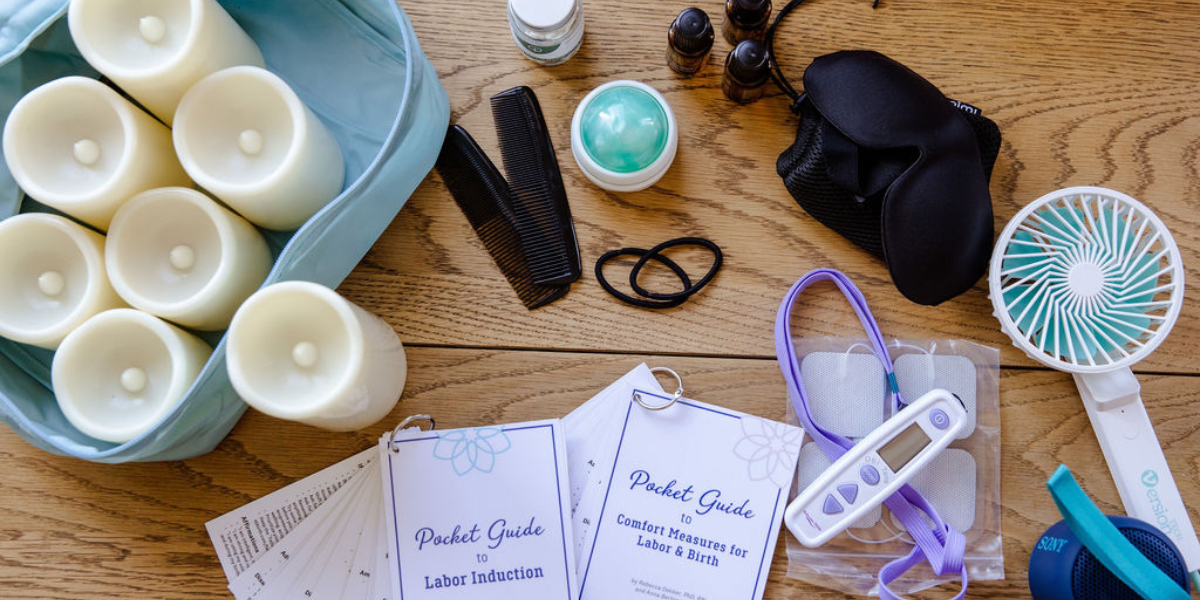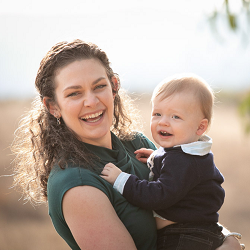
What Exactly is a Birth Doula? Definitions, Benefits, and Other FAQs
When I tell people I’m a doula, I’m usually met with one of two reactions: understanding or confusion. The vast majority of birthing people in the United States don’t use a birth doula. So, it’s not a surprise that there is more confusion (and misinformation) than understanding. We put together this list of answers to your frequently asked questions. Keep reading to learn what birth doulas do, how we can help, and why doula support is rising in popularity.
WHAT EXACTLY IS A BIRTH DOULA?
Simply put, a birth doula is a trained, non-medical professional who provides physical, emotional, and informational support during labor and childbirth. Although there is currently no governing body or legal requirements for doulas, many professional doulas complete extensive training, carry a certification, and stay up to date through continuing education courses, conferences, workshops, and self-study.
Birth doulas aren’t the only type of doulas out there! There are also postpartum doulas (for after your baby arrives), death doulas (for end-of-life support), and more.
WHAT IS THE DIFFERENCE BETWEEN A BIRTH DOULA AND A MIDWIFE?
Unlike a doula, a midwife is a trained medical professional. Their responsibilities include medical tasks such as prenatal care, vaginal exams, monitoring the fetus, prescribing and administering pain medication, and delivering babies vaginally. Midwives can do many of the same things that physicians might do for low-risk pregnancies and deliveries.
Midwives attend births at hospitals, birth centers, and homebirths. The credentials they carry and where they practice depends on what type of Midwife they are. Doulas also provide support in a variety of settings (including hospitals). However, it is outside of the scope of responsibilities of a doula to perform any kind of medical exam, assessment, or test. Because doulas are not medical professionals, they also do not offer medical advice or interpret medical images or test results.

SO, HOW DOES A BIRTH DOULA HELP DURING LABOR?
A doula’s sole responsibility is to support a birthing person (and their partner if applicable) through labor and childbirth. You can expect them to be by your side and fully focused on you from the moment they arrive until after your baby makes their entrance into the world. They can help you process what’s going on, figure out what questions to ask, remind you of your birth preferences, offer alternate coping strategies, and give your partner breaks during a long labor.
If you so desire, a doula can provide physical support as well. This might look like counterpressure, a warm or cool compress, and assisting with labor positions. Emotionally, your doula may support you with reassurance, praise, encouragement, and more. Educationally, your doula might teach you what questions to ask, how to advocate for yourself, and how to confidently make decisions, among other things.
Your nurse(s), midwife(s), or doctor(s) may have other patients to check on plus additional duties. Your doula’s only focus is you. Their job is to be there for you and your birth partner so you both feel safe, comfortable and supported.
ARE BIRTH DOULAS WORTH IT?
Studies have shown that it is highly beneficial for all birthing people to have continuous support throughout their labor. Furthermore, studies show that the benefits are even greater if that continuous support is coming from a trained doula instead of a family member, friend, or another member of your social circle.
Research tells us that the birthing people who are supported by a doula experience:
- Decreased rates of intervention, including c-sections or assisted births
- Decreased use of medications for pain relief
- Decreased risk of a low APGAR score at 5 minutes after birth
- Shorter labor with a decreased use of Pitocin
- Increased likelihood of spontaneous vaginal births
- Increased ability to cope with pain
- Increased satisfaction with the birth experience
In other words, the evidence tells us, a doula is a valuable and highly effective low-risk member of the birth team. Do you need a doula? Not necessarily. However, with benefits like these, we think all pregnant people should at least consider hiring a birth doula for their birth.
CAN MY PARTNER, FRIEND, OR FAMILY MEMBER BE MY BIRTH DOULA?
While romantic partners and other non-professional birth partners are essential sources of support, they aren’t able to offer the same level of support as a doula for a few reasons:
- Any support person will need time to rest, go to the bathroom, and eat (including your doula) during a long labor. After all, the average delivery lasts 12 – 24 hours for the first birth and 8 – 10 hours for subsequent births. Adding a doula to the team means there will always be someone who is present to provide support.
- Partners typically experience their own emotional journey as a witness to labor and childbirth. Your partner may feel many emotions, such as fear, concern, joy, excitement, or anxiety. Your doula can also help support them by answering any questions that come up, providing insights, and being calm and composed.
- Your partner likely doesn’t have the same experience, training, and knowledge to support you through labor and birth. When you hire a doula, you also hire their expertise. This can be vital if your labor doesn’t progress as planned and you find yourself having to make unexpected decisions.
There are training and prep classes for birth partners that can help them be more confident in their role, but we believe the most benefit comes from hiring a professionally trained doula.
If you have a friend or family member who also happens to be a professional doula, reach out and ask if they’d be willing to serve you in that way. Some people are all for it, while others may prefer to offer their support in a different capacity.

WHEN SHOULD I HIRE A BIRTH DOULA? IS IT TOO LATE?
It’s never too early to hire a doula. In fact, many doulas offer planning and education to support you as you prepare for your birth. Some doulas even offer fertility support. By starting your search early, you’ll have time to find the perfect addition to your birth team. You will also have plenty of time to get to know each other, explore your birth plans/preferences, and thoroughly prepare for birth.
That being said, it’s rarely too late to hire a doula. While we don’t recommend this, it’s not unheard of for a birthing person to hire a doula at the last minute as they’re going into labor.
HOW DO I PICK A BIRTH DOULA?
When you’re looking for a doula, it’s important to find someone you feel comfortable with and supported by. Birth is an intimate (and sometimes long) experience, so it’s important to pick someone that you WANT to have in the room with you!
Just because your friend had a wonderful experience with their doula does not automatically mean that person will be the best fit for you. We recommend contacting and interviewing at least 2 – 3 different doulas to find the person you connect with the most.
In addition to the basics (e.g. location, packages, and pricing), here are a few additional key points to consider:
- Does this individual have a level of professional experience I am comfortable with?
- Would I be comfortable being emotionally vulnerable in this person’s presence?
- Is it important to me that my doula and I share certain values or religious beliefs? If so, are we aligned in this way?
- Are the terms for working with this person a good fit for what I want and need? (Any prospective doulas should be able to provide a contract/agreement or document that explicitly states what their services include).
- Does their philosophy about birth and approach to doula work align with what I’m looking for and my expectations?
- Is this individual supportive of my birth preferences and hopes for childbirth? (If you don’t know what your birth preferences are yet, that’s okay! Your doula can help you figure those out).
If your answer to all of those questions is yes for a particular doula, they might be a good fit. Check in with your gut and trust your intuition! If you’re worried you might change your mind, get clear on their cancellation policy before you commit.
Note: Before you start your search, you may want to check with your provider and chosen birth location. See if they have any preferred doulas and/or policies that may impact your decision. Ask about things like limits on support people/visitors, proof of certification, etc.
WHERE CAN I FIND THE RESEARCH ON DOULA-ASSISTED BIRTHS?
Want to see the evidence for those benefits we listed above? You can read more about the scientific evidence on doula support here:
- Evidence on: Doulas
- Impact of Doulas on Healthy Birth Outcomes – PMC
- Study: Continuous support for women during childbirth
DO YOU OFFER BIRTH DOULA SERVICES?
Yes, we do! Two of the coaches on our team also serve their local communities as birth doulas. Richelle currently serves clients in Northern California (Marin County, Santa Rosa, and San Francisco). Emily serves clients in Bloomington, Indiana. We also offer virtual coaching and support to help you prepare for birth, get ready for parenthood, and adjust after your baby arrives.
- About the Author
- Latest Posts

Richelle’s passion is supporting growing families through the unpredictable and transformative journey of pregnancy and the first years of parenthood. In 2019, she set out with a vision to create a modern-day parenting village: From Pregnant to Parent. In addition to being our founder, she is a certified doula, childbirth and lactation educator, sleep coach, and RETAIN parental leave coach. When she isn’t working, she enjoys spending time with her husband and two kiddos around their home in Marin County (San Francisco Bay Area).
January 8, 2023
Richelle Clayton
A Note About Links: Our blog is reader supported. When you buy a product through the links on our site, we may earn a small affiliate commission. We promise, we only recommend products we genuinely like. Purchasing through our links doesn't effect the price you pay, but it does help to support our small business.
Leave a Reply Cancel reply
FTC Affiliate Disclosure: When you purchase through the links on our site, we may earn an affiliate commission at no extra cost to you. By doing so, you don't pay a higher price, but you do help to support our small business. If we ever promote something that was gifted to us, we'll be sure to say so. Regardless of whether or not we are earning a commission, we promise, we will only ever recommend products we genuinely like and use (or would use) ourselves.
Follow Me
On Instagram
Tips | Updates | Behind the Scenes
CLick Here
RESOURCES
RESOURCES
CONTACT
CONTACT
FOR PARENTS
FOR PARENTS
FOR PREGNANCY
FOR PREGNANCY
GET TO KNOW ME
HOME